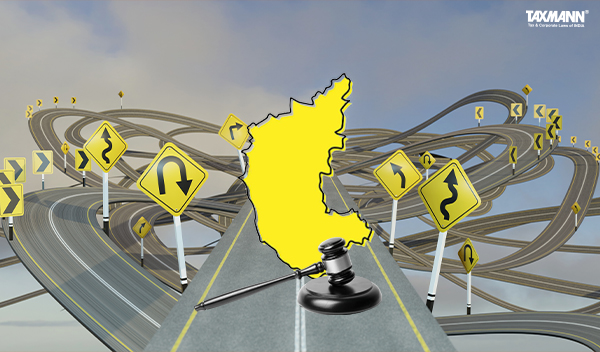Compensation Awarded for Land Acquired Under Provisions of Karnataka Highways Act Not Exempt from Tax Under RFCTLARR Act
- Blog|News|Income Tax|
- 3 Min Read
- By Taxmann
- |
- Last Updated on 18 November, 2024

Case Details: Commissioner of Income-tax (TDS) vs. Tushira Industries - [2024] 168 taxmann.com 169 (Karnataka)
Judiciary and Counsel Details
- Krishna S. Dixit & Vijaykumar A. Patil, JJ.
-
M. Thirumalesh & Roopa Anvekar, Advs. for the Appellant.
-
C.M. Chandrashekar, Senior Counsel, J.M. Anil Kumar, Adv. & V.S. Kalasurmath, HCGP for the Respondent.
Facts of the Case
The assessee, a company, was involved in the acquisition of land under the provisions of the Karnataka Highways Act, 1964. The Assessing Officer (AO) contended that the compensation received by the assessee would be subject to tax as per the normal provisions of the Income-tax Act.
The matter reached the Karnataka High Court.
High Court Held
The Karnataka High Court held that the exemption from income tax under Section 96 of the Right to Fair Compensation and Transparency in Land Acquisition, Rehabilitation and Resettlement Act, 2013, applies only to the awards or agreements made under the provisions of the said Act. The exemption is not applicable to compensation awarded for land acquired under the provisions of the Karnataka Highways Act, 1964.
The court held that the text of Section 96 is as clear as Gangetic Waters. It applies only to the awards or agreements made under the provisions of the said Act, which becomes apparent by the term ‘made under this Act’ consciously employed by the Parliament. To contend that even the awards passed under any other legislation would fit into the precincts of this provision is to render the said term otiose.
If the Parliament intended to exempt compensation from income tax, even when the acquisition is made, or awards are passed under “any law whichsoever”, it would have structured section 96 with a different text. After all, what income should be taxed and what should be exempted is a policy matter of Parliamentary wisdom.
The court also held that the argument that all persons who give up their lands in the statutory acquisition process, whichever be the enactment, would constitute one homogenous class and, therefore, section 96 of the 2013 Act should be read down as to include the awards made under other statutes as well, is too far-fetched an argument and therefore cannot be acceded to. Persons losing property in the acquisition under the 2013 Act constitute a class apart from those who do it under other statutes, at least for the purpose of claiming exemption from taxation.
List of Cases Reviewed
- KARUNANIDHI v. UOI (1979) 3 SCC 431 [para 4.1]
- ANIL AND OTHERS v. STATE OF KARNATAKA (2017) 3 KLJ 573 DB [para 4.1] followed.
- Order of Single Judge of High Court in WP No.103378 of 2017, WP No .103379 of 2017, WP No.103376 of 2017, WP No.103375 of 2017 and WP No.103377 of 2017, dated 12-4-2023 [para 4.9.9] set aside.
List of Cases Referred to
- other could not have been enacted. This view gains support from KARUNANIDHI v. UOI (1979) 3 SCC 431 (para 4.1)
- enactment would constitute one homogenous class vide NAGPUR IMPROVEMENT TRUST v. VITTAL RAO (1973) 1 SCC 500 (para 4.4)
- UNION OF INDIA v. TARSEM SINGH (2019) 9 SCC 304 (para 4.5)
- CIT v. Ghanshyam (HUF) [2009] 182 Taxman 368/315 ITR 1 (SC) (para 4.8)
- Bikram Singh v. Land Acquisition Collector [1996] 89 Taxman 119/[1997] 224 ITR 551 (SC) (para 4.9.3).
Disclaimer: The content/information published on the website is only for general information of the user and shall not be construed as legal advice. While the Taxmann has exercised reasonable efforts to ensure the veracity of information/content published, Taxmann shall be under no liability in any manner whatsoever for incorrect information, if any.

Taxmann Publications has a dedicated in-house Research & Editorial Team. This team consists of a team of Chartered Accountants, Company Secretaries, and Lawyers. This team works under the guidance and supervision of editor-in-chief Mr Rakesh Bhargava.
The Research and Editorial Team is responsible for developing reliable and accurate content for the readers. The team follows the six-sigma approach to achieve the benchmark of zero error in its publications and research platforms. The team ensures that the following publication guidelines are thoroughly followed while developing the content:
- The statutory material is obtained only from the authorized and reliable sources
- All the latest developments in the judicial and legislative fields are covered
- Prepare the analytical write-ups on current, controversial, and important issues to help the readers to understand the concept and its implications
- Every content published by Taxmann is complete, accurate and lucid
- All evidence-based statements are supported with proper reference to Section, Circular No., Notification No. or citations
- The golden rules of grammar, style and consistency are thoroughly followed
- Font and size that’s easy to read and remain consistent across all imprint and digital publications are applied



 CA | CS | CMA
CA | CS | CMA

One thought on “Compensation Awarded for Land Acquired Under Provisions of Karnataka Highways Act Not Exempt from Tax Under RFCTLARR Act”